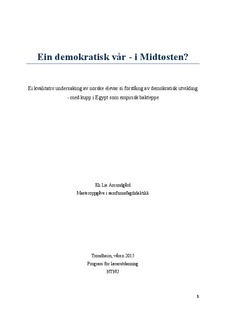| dc.description.abstract | I denne studien har eg undersøkt korleis elevar på to forskjellige vidaregåande skuler på
forskjellige stader i Noreg held seg til forskjellige omgrep knytt til demokrati og
statsdanningar. Elevane fekk spørsmål om tema i samanheng med Egypt, hendingane i landet
etter den arabiske våren, og om Midtøsten som geografisk område. I undersøkinga har eg i
hovudsak brukt kvalitativ metode og gruppeintervju, supplert av observasjon av elevane
medan dei diskuterte seg imellom. Problemstillinga mi er:
Kva forstår norske elevar i vidaregåande skule av det som har skjedd i det politiske
landskapet i Egypt i høve til omgrepa kupp, demokrati og demokratisering aktualisert av
hendingar under den arabiske våren? Korleis syn og forståing har norske elevar for
Midtøsten som eit politisk og geografisk område?
Ut i frå problemstillinga stilte eg tre forskingsspørsmål:
1. Korleis forstår elevane det geografiske området Midtøsten (for eksempel plassere land
og kven som styrer/har styrt landa)?
2. Korleis forstår elevane dei demokratiske tilhøva i Egypt?
3. Korleis forstår elevane demokratiutvikling i Egypt i høve til kupp-omgrepet?
a. Skil elevane mellom omgrepa ”militærkupp”, ”statskupp” og ”demokratisk kupp”?
b. Korleis forstår elevane kupp-omgrepa i høve til demokratisering under den
arabiske våren?
Elevane hadde kjennskap til det geografiske Midtøsten. Dei identifiserte ulike land som dei
meinte låg i Midtøsten og kom med grunngjeving til vala, her trakk dei linjer til den arabiske
våren og inkluderte Nord Afrika som ein del av Midtøsten på grunn av likskapane mellom
landa. Elevane hadde derimot vanskar med å plassere statsleiarane til riktig land, dei fleste
gruppene klarte statsleiarane som hadde vore mest i nyheitsbilete, men resten meinte dei var
vanskeleg. Ingen av elevane meinte demokratiet hadde ei god stilling i Egypt og dei meinte eit
val der vanskeleg kunne vere demokratisk. Undersøkinga viste også variasjon i høve til
omgrepsforståing til elevane, men det var ein gjennomgåande tendens til at dei kunne forklare omgrepa med eiga ord utan bruk av fakta basert kunnskap. Vanskelegast var ”statskupp” og
”demokrati”, mens alle elevane hadde gjort seg opp ei meining om ”demokratisk kupp”
Det var eit komplisert tema å diskutere og utan det tilsendte informasjonsskrivet trur eg det
hadde vore vanskeleg for fleire av elevane å diskutere dei ulike omgrepa. Kunnskapen dei
hadde om Midtøsten trur eg dei ville kome fram uavhengig av dette informasjonsskrivet | nb_NO |
| dc.description.abstract | In this research I have examined how students in two separate high schools, with two survey
groups each, in different locations in Norway, understand distinctive concepts in connection
to coups and democracy. The students were asked questions about topics including Egypt,
occurrences in the nation in wake of the Arab Spring, and the Middle East as a geographical
region. This has been a primarily qualitative research with group interviews and observations
of the students debating among themselves. My research question is as follows:
What are Norwegian high school students’ understanding of the political landscape in Egypt
regarding concepts like coup, democracy, democratization and the challenges surrounding
these? What kind of knowledge and understanding do the students have about Middle East
political geography?
Based on this I further asked the following questions:
1. How do the students understand the Middle East as a geographical region (e.g.
displaying the different states on the map, knowing the current and former leaders)?
2. How do the students understand the democratic circumstances in Egypt?
3. How do the students understand the democratic progress in Egypt in relation to the
concept of coups?
a. Do the students distinguish between the concepts of “military coup”, “coup
d’état” and “democratic coup d’état”?
b. How do the students understand the concepts of coups in relation to the
democratization in the Arab Spring?
The students expressed knowledge of the geographical Middle East. They identified different
states that they argued should be placed in the area in a political sense, related this to the Arab
Spring, and included North Africa in the Middle East based on the similarities between the
states. Connecting the leaders to the their respective states proved to be more difficult though;
the majority of the students managed to correctly place the most media profiled leaders, but
had trouble placing the others. The consensus among the students was that democracy does
not have a strong position in Egypt; they argued that their elections hardly could be
8
categorized as democratic. The research also showed varying degrees of the understanding of
concepts, but still a general tendency to manage to explain them in their own words without
the use of fact based knowledge. “Coup d’état” and “democracy” were the most demanding
concepts to explain, while all the students had an idea on “democratic coup d’état”
A complicated subject for debate, without the information letter I sense that discussing
these concepts would have been even more arduous for the students. That said, in my view
their knowledge surrounding the Middle East would still have manifested itself, a lack of the
information letter notwithstanding | nb_NO |
